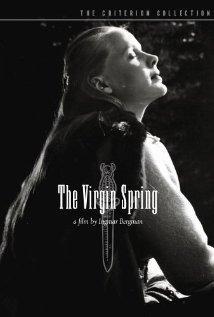- Film:
- Ingmar Bergman
Reviewed by: David M. Brown
- Rating:
- 4
Summary:
The Virgin Spring is a brutal and poignant film about a horrific act by two men against a teenage girl and the vengeance that her father takes against them.
More DetailsAbout The Virgin Spring (1960) Based on thirteenth-century folklore, Ingmar Bergman’s film explores themes of religion and guilt in a medieval setting. A young girl is raped and murdered by three goatherds while en route to church. The girl’s killers then take refuge at a farm, not knowing that it is owned by the parents of the girl they have just killed. All is revealed when the mother finds her daughter’s bloodied robe and she realises what has happened. The father then avenges his daughter’s death causing a spring to bubble up on the spot she was killed.
Based on thirteenth-century folklore, Ingmar Bergman’s film explores themes of religion and guilt in a medieval setting. A young girl is raped and murdered by three goatherds while en route to church. The girl’s killers then take refuge at a farm, not knowing that it is owned by the parents of the girl they have just killed. All is revealed when the mother finds her daughter’s bloodied robe and she realises what has happened. The father then avenges his daughter’s death causing a spring to bubble up on the spot she was killed.
Starring: Max von Sydow, Birgitta Valberg, Gunnel Lindblom, Birgitta Pettersson, Axel Düberg
Directed by: Ingmar Bergman
Runtime: 89 minutes
Studio: Criterion
Amazon USAmazon UKIMDBReview: The Virgin Spring
This is my first experience of Ingmar Bergman and what a promisng start it is. The Virgin Spring is a simple tale of a Christian couple, Tore (Max von Sydow) and Mareta (Birgitta Valberg), who dote on their beautiful 15 year old daughter, Karin (Birgitta Pettersson). Also living with the family is a servant, Ingeri (Gunnel Lindblom) who secretly worships the Norse god, Odin, and has brought shame on the family by getting pregnant out of wedlock. Tore asks Karin to take some candles to the local church and the girl takes Ingeri along for company. Late at night only Ingeri returns.
At the outset Karin is dressed in her finest garments and sets out on her horse with Ingeri close by. Ingeri eventually decides she can’t go on and Karin continues alone. Being innocent as she is, Karin sees no threat from two herdsmen (Axel Duberg and Tor Isedal) and their young brother (Ove Porath). Karin shares food with them but when it comes to leaving she is stopped by the trio with both men raping her. When Karin tries to escape, the mute herdsman strikes her on the head and kills her instantly. All the time the attack is going on, Ingeri looks on from a distance in tears but does not intervene. She has prayed to Odin for something bad to happen to Karin and her prayers have been answered. There is a twist in this story though. The three herdsmen show up at Karin’s home looking for shelter and not realising who their hosts are. When they offer to sell Karin’s stolen clothes to Mareta she goes to her husband who immediately seeks bloody revenge.
The Virgin Spring is a brutal and poignant film about a horrific act by two men against a teenage girl and the vengeance that her father takes against them. Addressing many fascinating issues, this is wonderfully filmed, acted and though it has a Medieval setting much of its message still reverberates to this day.
Verdict: 4/5
(Film source: reviewer’s own copy)

About the Author:
I was born in Barnsley, South Yorkshire, England and have always been a bookworm and enjoyed creative writing at school. In 1999 I created the Elencheran Chronicles and have been writing ever since. My first novel, Fezariu's Epiphany, was published in May 2011. When not writing I'm a lover of films, games, books and blogging. I now live in Huddersfield, West Yorkshire, with my wife, Donna, and our six cats - Kain, Razz, Buggles, Charlie, Bilbo and Frodo.
David M. Brown – who has written 704 posts on Tweedle Dee and Tweedle Dave.

 •
•  •
•  •
•  •
• 

